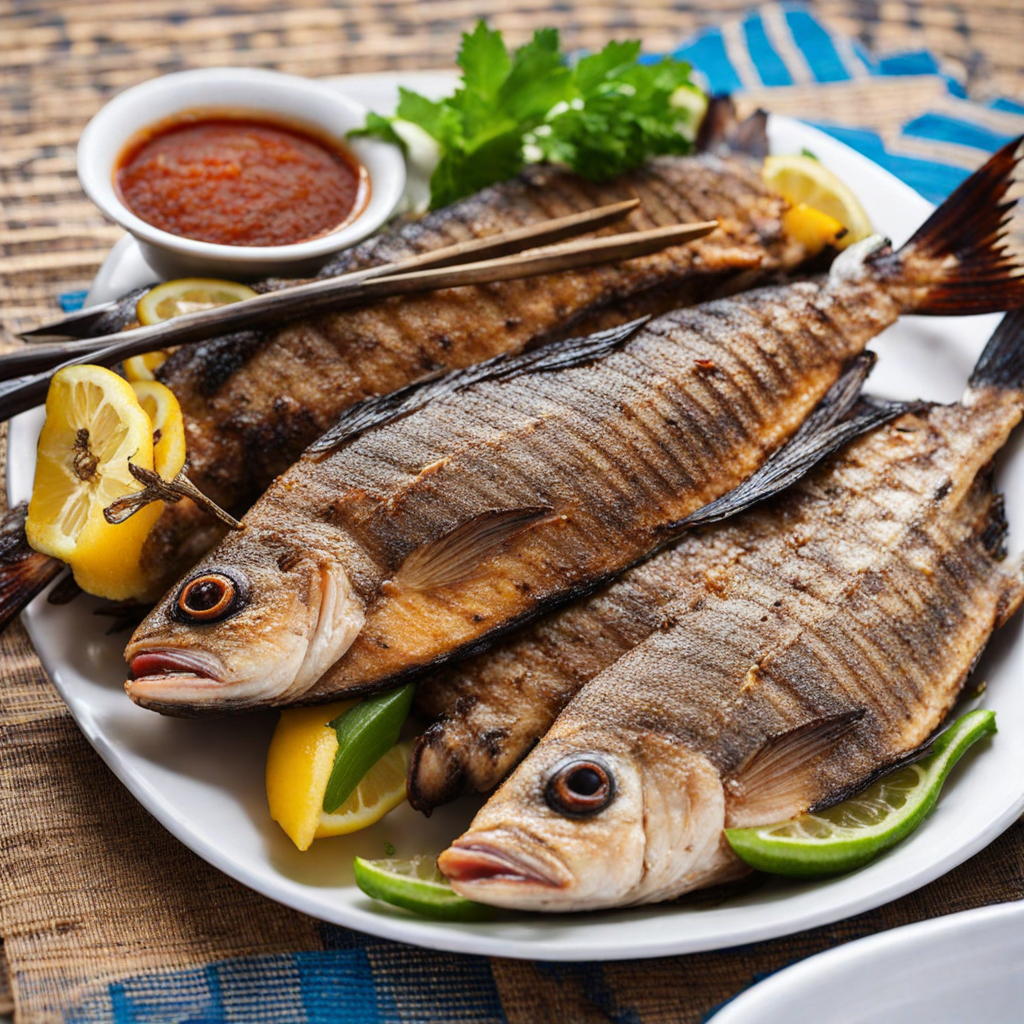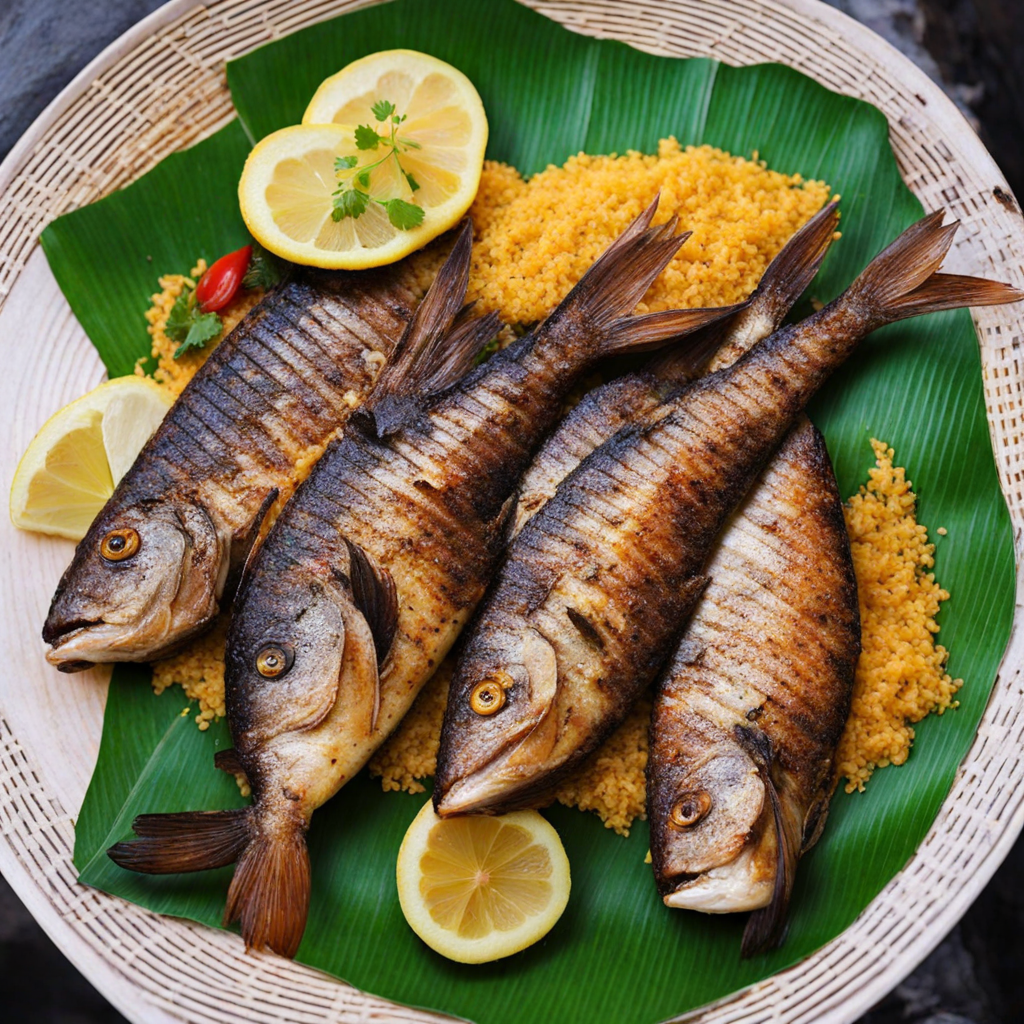Grilled fish
Grilled fish in Mali is a culinary delight that showcases the region's rich aquatic resources and traditional cooking methods. The fish, often caught fresh from the Niger River or local lakes, is typically marinated with a blend of local spices, including ginger, garlic, and chili, which infuse the flesh with vibrant flavors. The marinade not only enhances the taste but also tenderizes the fish, making it succulent and juicy once grilled. This dish often features varieties such as tilapia or catfish, which are favored for their mild flavor and firm texture, perfect for grilling over an open flame. Cooking the fish is an art in itself, as it's usually placed on a grill made from woven bamboo or metal, allowing the smoky aroma to permeate the flesh. The grilling process is an integral part of the experience, as it brings people together around a fire, creating a communal atmosphere. As the fish sizzles, the skin crisps up beautifully while the inside remains moist, resulting in a delightful contrast of textures. Often, the grilled fish is served with a side of spicy sauce, made from tomatoes, onions, and local peppers, adding an extra kick that complements the dish perfectly. Accompanying the grilled fish are traditional staples such as rice, millet, or fufu, which help balance the meal. A fresh salad of chopped tomatoes, cucumbers, and onions may also be served, adding a refreshing crunch and brightness to the plate. The combination of flavors—from the smoky, spiced fish to the hearty sides—creates a harmonious and satisfying dining experience. Grilled fish in Mali is not just a meal; it's a celebration of culture, community, and the natural bounty of the land and waters.
How It Became This Dish
The History of Poisson Grillé: A Culinary Jewel of Mali #### Origins Poisson Grillé, or grilled fish, stands as a culinary staple in the vibrant tapestry of Malian cuisine. The roots of this dish can be traced back to the rich waterways that crisscross the West African nation of Mali, particularly the Niger River, which is one of the longest rivers in Africa. This vital waterway has not only shaped the geography and agriculture of Mali but has also been a source of sustenance and cultural identity for its people. Historically, the Niger River has supported a variety of fish species, making fishing an essential practice for local communities. The tradition of grilling fish likely emerged as a practical method of cooking that combined the need for preservation with the artistry of culinary expression. The use of fire for cooking dates back thousands of years, and in Mali, grilling fish became a favored method due to its ability to enhance the natural flavors of the fish while imparting a smoky aroma that tantalizes the senses. #### Cultural Significance In Mali, food is more than just sustenance; it is a vital part of social interactions, celebrations, and cultural identity. Poisson Grillé reflects the communal nature of Malian society, where meals are often shared among family and friends. Grilled fish is featured prominently at various social gatherings, ranging from family feasts to village celebrations. It is a dish that brings people together, fostering bonds and creating shared experiences. The preparation of Poisson Grillé is often an event in itself, with family members and friends gathering around the grill, sharing stories and laughter while the fish cooks over open flames. The communal aspect of this dish is further emphasized during festive occasions, where it may be served alongside other traditional dishes, such as rice, sauces, and maafe (a peanut-based stew). In addition to its social significance, Poisson Grillé also plays a role in the spiritual and cultural practices of the Malians. Fishing itself is often surrounded by rituals and customs, with fishermen invoking blessings before embarking on their journeys. The act of grilling the day's catch can be seen as a celebration of nature's bounty, and the flavors of the dish reflect the connection between the people and their environment. #### Ingredients and Preparation While the specifics of Poisson Grillé can vary by region and individual preference, the fundamental elements remain consistent. Fresh fish, typically sourced from the Niger River, is marinated in a blend of local spices, herbs, and sometimes citrus juices to enhance flavor. Common fish varieties used include tilapia, catfish, and bream, each bringing its unique texture and taste to the dish. The marinade often includes ingredients such as garlic, onions, ginger, and a variety of spices that can range from mild to intensely flavorful. The use of local ingredients emphasizes the connection between the dish and its geographical origins, showcasing the diverse agricultural bounty of Mali. Once marinated, the fish is skewered and grilled over an open flame, allowing the heat to create a perfectly cooked, tender, and flaky interior while achieving a charred, crispy exterior. #### Development Over Time As Mali has evolved through the centuries, so too has the preparation and presentation of Poisson Grillé. The dish has undergone transformations influenced by various factors, including globalization, urbanization, and the introduction of new culinary techniques. While traditional methods are still cherished, modern Malian cooks have begun to experiment with flavors and ingredients that reflect the changing landscape of the culinary world. The advent of tourism has also played a role in the evolution of Poisson Grillé. As visitors from around the globe arrive in Mali, they bring with them diverse tastes and preferences that have inspired local chefs to adapt their recipes. Street food culture has blossomed in urban areas, where grilled fish is often sold at bustling markets and food stalls. This accessibility has introduced Poisson Grillé to a wider audience, further solidifying its place in the culinary landscape of Mali. In contemporary Mali, Poisson Grillé has transcended its traditional roots while retaining its essence. It is now a beloved dish found in restaurants, street vendors, and homes alike, enjoyed by locals and visitors. The dish often accompanies a variety of sides, including spicy sauces, fried plantains, and fresh salads, showcasing the versatility of Malian cuisine. #### Conclusion The history of Poisson Grillé in Mali is a reflection of the country’s rich cultural heritage and its deep connection to the land and waterways that define it. From its origins as a simple, practical dish for local communities to its current status as a symbol of social connection and culinary delight, Poisson Grillé embodies the spirit of Mali. As Mali continues to navigate the complexities of modernity while honoring its traditions, Poisson Grillé remains a beloved dish that unites people and celebrates the rich culinary landscape of this West African nation. Whether enjoyed at a festive gathering or on a casual afternoon, grilled fish is more than just a meal; it is a testament to the resilience and creativity of the Malian people, a dish that tells a story of community, culture, and the enduring bond between nature and cuisine.
You may like
Discover local flavors from Mali







